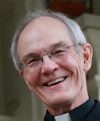- As part of her internship at Lutheran Church of the Epiphany, Winston-Salem, N.C., Heather Bachelder gave the above Valentine messages to kids in the congregation and in the church’s child care center. She says her internship experiences were “expectedly formative and full of surprises, delights and lots of trust.” Photos: Courtesy of Heather Bachelder
- Bachelder, with a little help from a friend, visits an assisted-living facility as part of her internship at Epiphany. Pastoral interns are urged to experience the full range of parish life, including visits with the sick and homebound.
Beginning in the 1960s, Lutherans adopted a unique way of equipping people for ministry, as Christian leadership formation is described in Ephesians 4. A year serving a congregation as an intern, also known as a vicar, soon became a requirement for all pastoral candidates. This affords seminarians the opportunity for real-life ministerial experience alongside a veteran minister, with coaching by mature lay leaders as well.
In the traditional sequence, internship comes after two years in seminary and is followed by the senior year in academic studies. An increasing number of vicars complete the requirement after finishing their academic studies; this means one less household move, which is significant because most internships are distant from a seminary.
Though vicars carry out many of the same duties as those already ordained, they aren’t mini-pastors. Except in unusual circumstances, such as a bishop granting temporary authorization, interns don’t preside at sacraments or conduct pastoral acts such as marriages. But a pastoral intern is encouraged to experience the full range of parish life—preaching and leading worship, teaching classes, visiting the sick and homebound, and gaining experience in parish leadership. Now that the ELCA has ordained deacons, this cadre of leaders must also complete an internship, which typically combines congregational work with ministry in a social service setting.
“Most formative year of seminary”
Years after ordination, many pastors point to their internship as pivotal in their ministerial formation. Ordained in 2014, Lauren Muratore is pastor of Augustana Lutheran Church in Washington, D.C. Describing her internship at First Lutheran Church in Lincoln, Neb., as “the most formative year of seminary,” Muratore said the experience taught her “how to communicate theology and learn how it matters in people’s lives and the world.”
Pastors are often called to serve in parishes and communities very different from those in which they grew up. Internship helps prepare seminarians for that reality. Muratore, who was raised in Baltimore and studied at United Lutheran Seminary in Gettysburg, Pa., said she held perceptions about the Midwest that were soon shattered after arriving in Lincoln. “It taught me not to prejudge but be open to hearing everyone’s story,” she said.
Kurt Saenger-Heyl, a senior at Wartburg Theological Seminary in Dubuque, Iowa, recently concluded his internship at Bethesda Lutheran in New Haven, Conn., a congregation that also provides Lutheran campus ministry at Yale University. Saenger-Heyl said his internship enabled him to “test the waters in each area” of ministry. His supervisor and Bethesda’s members helped him discover how to maintain a good work-life balance and “how to manage always-changing demands” faced by a pastor.
Few experiences embody the ELCA’s organizational principle of interdependence among congregations, synods, the churchwide organization and outside institutions better than internship.
“Internship continues to be vital to the on-the-ground formation of future leaders.”
Seminaries are responsible for selecting parishes to serve as teaching sites and for assigning vicars to them. They keep watch over how an internship unfolds, receiving reports from the intern, the pastor and a lay coaching committee. A synod candidacy committee also weighs in on the placement and reviews the experience afterward with all parties. Churchwide standards guide the process.
Stacey Nalean-Carlson, director of contextual education at Wartburg, said the seminary is grateful for all the partner organizations, congregations and synods that support its students. “As I tell every internship team I meet with, ‘We cannot do this work without you,’” she said.
Chelle Huth, director of field formation at United Lutheran Seminary, agreed: “Internship continues to be vital to the on-the-ground formation of future leaders.”
Seminaries and synods recognize that some of the most promising sites are unable to afford an intern. Though modest, the monthly stipend of $1,800 (increasing next year to $2,000) plus housing costs is beyond the reach of many congregations. Huth said United is exploring ways some parishes might receive subsidies to host an intern.
Leaving a legacy
While internship is intended to benefit primarily the student, many congregations are impacted deeply by vicars. For example, bishops have long pointed to congregations that were reluctant to call a female pastor but did so enthusiastically after hosting a woman intern. Throughout the pandemic, many tech-savvy interns have helped congregations develop online worship and other virtual-outreach efforts.
Heather Bachelder, now pastor of Wittenberg Lutheran, Granite Quarry, N.C., interned at Lutheran Church of the Epiphany in Winston-Salem, N.C., where she helped the congregation expand its physical accessibility. Bachelder was amazed at the congregation’s receptivity to her efforts. “They trusted me with their griefs and joys,” she said. “It was a huge thing to open their homes, their hearts and their stories to me.”
Currently interning in a three-point Nebraska parish, DaMisha McFarland-Pollock describes herself as “a Black woman serving in a STaR (Small Town and Rural) setting.” She is confident that her presence will further enhance “small-town churches being open to call church leaders of all races and genders.”
A native of West Virginia and a Wartburg seminarian, McFarland-Pollock said she is working on creating intergenerational experiences that will help congregations expand their understanding of diversity and inclusivity.
Many worry about the future, yet congregations that have interns are likely to agree that the church of tomorrow will be blessed with good leaders.





